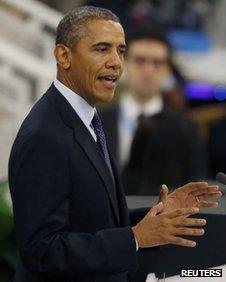Obama agonising on America's global role, continued
- Published
- comments

A speech full of headlines, yet uncertainty ruled
President Barack Obama's speech to the United Nations was in some ways a distillation of his policy swerves of the last month, a continuation of his public agonising about America's role in the world.
And that is not necessarily a bad thing.
It won't be what is most talked about, for there were enough headlines:
His demand for a "strong" UN resolution with "consequences" if Syria fails to act on chemical weapons
His urging that Iran and Russia should abandon Syrian President Bashar al-Assad
Putting the Middle East peace process on equal footing with Iran's nuclear programme in the list of US diplomatic concerns
His warm words of hope towards Iran, and the possibility of a negotiated solution to the crises that have loomed over the world
There is a lot of red meat to be chewed over in that little lot.
Multiple-choice speech
But he also asked the question that frequently lies behind the use of American, and Western, military might, but goes beyond the question of national interest.
On the one hand there was the choice of "standing callously by" as children are gassed. On the other, "embroiling ourselves in someone else's civil war".
He asked if the world would allow another Srebrenica or Rwanda, or stand by and allow the "cold logic of mass graves".
He asked if Libya would be better off with Gaddafi still in charge, mired in dreadful civil war.
Rhetorical flourishes, you might think.
He argued that there was no such thing as an American Empire, but that the country was exceptional, acting not just in its own interests, but those of others.
He said the danger for the world was not a US too eager to engage, but one that might disengage and leave a vacuum of leadership.
But he provided no fast rule, no easy measure for the hard decision of when to use its muscle. And he has not really answered his own question on Syria.
It is easy to mock his multiple-choice speech. Treating people like grown-ups is not always good politics.
But he is urging Americans, and the rest of the world to answer the question, when to intervene and when to leave well alone, and to think what that choice implies.
It is an odd, conflicted style of leadership: a philosopher king in a world that doesn't like, but at least understands, the cowboy who shoots from the hip.
"We live in a world of imperfect choices," Mr Obama said.
That line seems more like a conclusion than a passing phrase on the way to greater certainty.